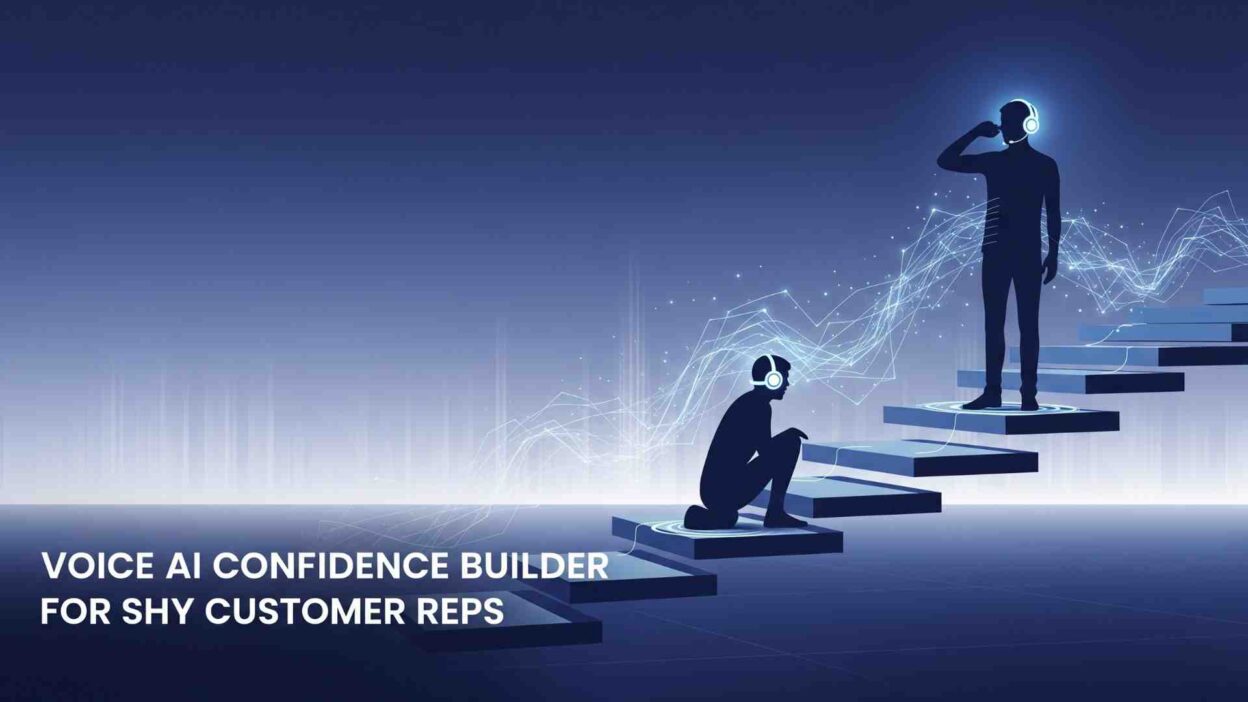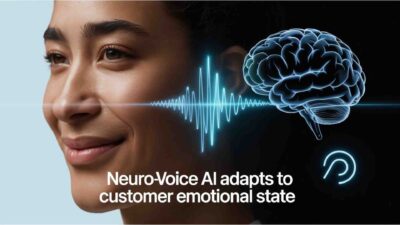TL;DR Voice AI confidence-building technology is revolutionizing how customer service teams overcome communication barriers and performance anxiety. Customer representatives who struggle with shyness can now develop professional communication skills through AI-powered training platforms. These innovative solutions create safe practice environments for building confidence.
Table of Contents
What is Voice AI Confidence Building?
Voice AI confidence-building refers to artificial intelligence systems designed to help shy employees practice customer interactions. These platforms simulate real customer conversations without the pressure of live calls. Representatives can practice difficult scenarios repeatedly until they feel comfortable.
The technology uses natural language processing to create realistic dialogue scenarios. Voice AI confidence building systems analyze speech patterns and provide instant feedback. Teams can identify areas for improvement through detailed performance analytics.
Key Features of Voice AI Training Systems
Modern voice AI platforms offer comprehensive training modules for customer service teams. Interactive role-playing scenarios help representatives practice common customer interactions. Real-time feedback systems provide suggestions for improving communication skills.
Speech analysis tools evaluate tone, pace, and clarity during practice sessions. Customer rep training becomes more effective with personalized learning paths. Representatives can focus on specific skills that need improvement.
Benefits for Shy Customer Representatives
Social anxiety AI solutions create judgment-free environments for skill development. Representatives can make mistakes without embarrassing consequences during training sessions. Repeated practice builds muscle memory for confident customer interactions.
The technology reduces performance anxiety by providing unlimited practice opportunities. Voice AI confidence building systems track progress over time. Representatives can see tangible improvements in their communication abilities.
How Voice AI Builds Confidence in Customer Service Teams
Customer service representatives often struggle with communication anxiety during live calls. Voice AI training platforms address these challenges through structured learning experiences. Representatives can practice at their own pace without external pressure.
Creating Safe Practice Environments
Social anxiety AI platforms eliminate the fear of judgment from supervisors or customers. Representatives can experiment with different communication approaches safely. Mistakes become learning opportunities rather than sources of embarrassment.
The technology provides immediate feedback without human judgment. Customer rep training sessions can be repeated until confidence levels improve. Representatives develop skills gradually through consistent practice.
Personalized Learning Experiences
Voice AI systems adapt to individual learning styles and pace preferences. Representatives receive customized training scenarios based on their specific needs. Social anxiety AI technology identifies communication weaknesses and targets improvement areas.
Progress tracking features show representatives their skill development over time. Customer rep training becomes more engaging through gamification elements. Achievement milestones motivate continued learning and practice.
Real-World Applications and Success Stories
Many companies have successfully implemented voice AI confidence-building programs. Customer service teams report significant improvements in communication confidence levels. Representatives who previously avoided phone calls now excel in customer interactions.
Industry Implementation Examples
Call centers have reduced employee turnover through voice AI training programs. Customer rep training initiatives show measurable improvements in customer satisfaction scores. Representatives feel more prepared for challenging customer conversations.
AI-powered interactive learning experiences with timely feedback allow agents to role-play tough conversations, including real past calls. This approach helps representatives tackle difficult situations with increased confidence.
Measuring Training Effectiveness
Voice AI platforms provide detailed analytics on representative performance improvements. Customer service managers can track confidence levels through objective metrics. Social anxiety AI solutions demonstrate clear return on investment through improved performance.
Training completion rates increase when representatives can practice at comfortable paces. Customer satisfaction scores improve as representatives become more confident communicators. Employee engagement levels rise when training feels supportive rather than stressful.
Best Practices for Implementing Voice AI Training
Successful voice AI confidence-building implementation requires careful planning and execution. Organizations should start with pilot programs to test effectiveness. Customer rep training initiatives work best when integrated with existing development programs.
Getting Started with Voice AI Training
Begin by identifying representatives who would benefit most from confidence-building support. Social anxiety AI platforms should complement rather than replace human coaching. Training programs need clear objectives and measurable success criteria.
Representatives should understand how voice AI training supports their professional development. Customer service managers must champion the technology for successful adoption. Regular feedback sessions help optimize training program effectiveness.
Maintaining Engagement and Progress
Voice AI training programs require ongoing support and encouragement from leadership teams. Representatives need regular check-ins to discuss progress and challenges. Social anxiety AI solutions work best with consistent usage patterns.
Celebrate improvements and milestones to maintain motivation levels among participants. Customer rep training should evolve based on representative feedback and performance data. Continuous program refinement ensures long-term success and engagement.
The Future of Voice AI in Customer Service Training
Voice AI confidence-building technology continues advancing with improved natural language capabilities. Customer service training will become increasingly personalized and effective. Representatives will benefit from more sophisticated practice scenarios and feedback systems.
Emerging Technologies and Trends
Nearly 80 percent of CX leaders believe voice AI is ushering in a new era of more seamless problem-solving. This trend indicates growing confidence in AI-powered training solutions for customer service teams.
Virtual reality integration will create even more immersive training experiences. Social anxiety AI platforms will incorporate emotional intelligence recognition capabilities. Customer rep training will become more adaptive to individual psychological needs.
Long-term Impact on Customer Service
Voice AI training will standardize confidence-building across customer service industries. Representatives will enter roles better prepared for challenging customer interactions. Social anxiety AI solutions will reduce barriers to customer service career advancement.
Companies investing in voice AI confidence-building will gain competitive advantages. Customer satisfaction levels will improve as representatives become more skilled communicators. Employee retention rates will increase when training supports professional growth.
Read More: Legal Voice AI Transcription Saves Law Firms 60%
Conclusion

Voice AI confidence-building represents a transformative approach to customer service training and development. Shy customer representatives can overcome communication barriers through supportive AI-powered practice environments. These technologies create safe spaces for skill development without judgment or embarrassment.
The benefits extend beyond individual confidence-building to improved customer satisfaction and team performance. Customer rep training becomes more effective when representatives can practice repeatedly at a comfortable pace. Social anxiety AI solutions address real workplace challenges while supporting professional growth.
Organizations implementing voice AI training programs see measurable improvements in employee confidence and customer service quality. The technology complements human coaching while providing scalable training solutions for growing teams. Voice AI confidence-building will continue evolving to meet the changing needs of customer service professionals.
Investment in these innovative training platforms demonstrates commitment to employee development and customer experience excellence. Representatives equipped with strong communication skills contribute to business success and customer loyalty. Voice AI confidence building technology offers a practical path forward for addressing communication anxiety in customer service roles.





